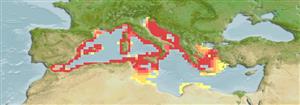Common names from other countries
Classification / Names / Names
俗名 | 同種異名 | Catalog of Fishes (gen., sp.) | ITIS | CoL | WoRMS
Environment: milieu / climate zone / depth range / distribution range
生態學
; 深度上下限 10 - 1016 m (Ref. 66603), usually 10 - 100 m (Ref. 358).
分布
國家 | FAO區域 | 生態系 | 發現紀錄 | 簡介
Eastern Atlantic and the Mediterranean.
Length at first maturity / 大小 / 重量 / 年齡
Maturity: Lm ? range ? - ? cm Max length : 3.0 cm COLD 雄魚/尚未辨別雌雄; (Ref. 363)
Arborescent colonies, with growth irregularly divided into all directions, provided with a Hard skeleton calcareous: can exceed 50 cm, but in general less developed. The surface of the ramifications is not smooth. Polyp: reach the diameter of 0.15 cm; they are white and translucent, the cortical fabric being of red color, seldom white or yellow. The skeleton is highly colored of red; more rarely of pink; dark; white red or to black (Ref. 358). Certain colonies: 20 cm height, but intensive fishing makes disappear the largest specimens. Diameter of the base: 3 cm at the largest specimens (Ref. 363).
Hard skeleton calcareous: can exceed 50 cm, but in general less developed. Polyp: reach the diameter of 0.15 cm. Depth: commonly 10 m of depth; currently, it is necessary to go down beyond the 30 m, generally even 40 m, and until several hundred meters of depth (Ref. 358). Maximum depth and common maximum depth from Ref. 122525.
Life cycle and mating behavior
成熟度 | 繁殖 | 產卵場 | 卵 | 孕卵數 | 仔魚
Members of the class Anthozoa are either gonochoric or hermaphroditic. Mature gametes are shed into the coelenteron and spawned through the mouth. Life cycle: The zygote develops into a planktonic planula larva. Metamorphosis begins with early morphogenesis of tentacles, septa and pharynx before larval settlement on the aboral end.
主要參考資料
參考文獻 | 合作者 | 合作者
Göthel, H. 1992. (Ref. 358)
IUCN 瀕危狀態 (Ref. 130435: Version 2024-1)
CITES狀態 (Ref. 108899)
Not Evaluated
Not Evaluated
人類使用
漁業: 商業性
FAO - 漁業: landings, 魚種描繪 | FishSource | 周邊海洋
工具
網路資源
Estimates based on models
Preferred temperature
(Ref.
115969): 13.8 - 19.6, mean 17.7 (based on 240 cells).
回復力
低的, 最小族群倍增時間4.5 - 14 年 (K=0.06).
瀕危性
Moderate to high vulnerability (46 of 100).
價格種類
Unknown.
